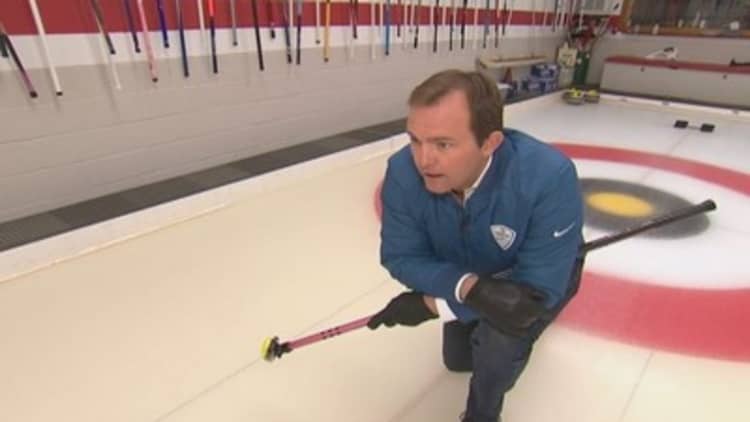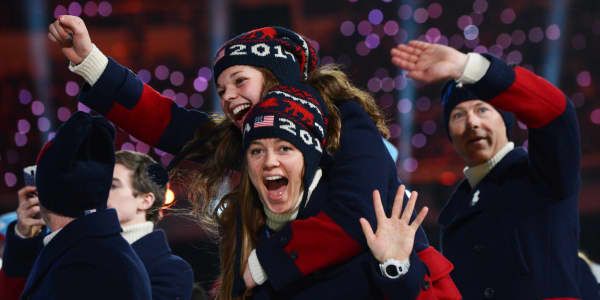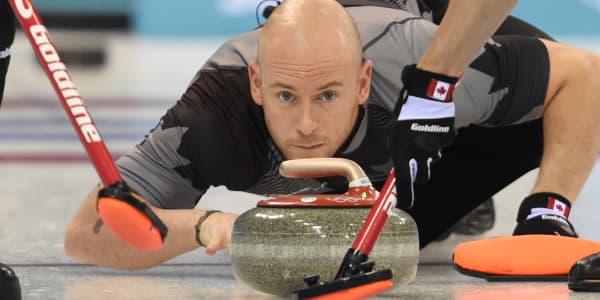Olympic athletes can burn very bright, but usually for only a short time. Where their lives lead them professionally after the games depends on a lot—from their sport and Olympic performance to their aspirations and inclination.
CNBC spoke with three former medal winners whose experiences run the gamut from the superstar to the hard-working "average guy," and got a glimpse of their very different stories.
The figure skater: Life of a star
The lyrics of a rap song may be one of the last places a figure skater would expect to be mentioned, but then again, 1992 gold medalist Kristi Yamaguchi isn't just any figure skater. Rapper Young Dro mentioned the Olympic superstar with the lyrics, "I'm skatin' on ice like Kristi Yamaguchi"—in 2006, 14 years after Yamaguchi won gold.
"It surprises me anytime that happens, and that people still remember," Yamaguchi told CNBC.
(Read more: What's that medal worth? Hint: Forget the gold)
Since the 1992 Games in Albertville, France, Yamaguchi has not wanted for high-profile projects and engagements, either on or off the ice.
"It's been, for the most part, kind of nonstop," she said.
In 1992, Yamaguchi began a decade-long stretch of touring with the "Stars on Ice" professional figure skating show, and in 1996, she started the "Always Dream Foundation," a charity that the mother of two devotes to the cause of early childhood literacy.

Then, of course, there are her business projects. For eight years, Yamaguchi was a representative for NYSE-listed Celanese, and in 2012, she started an activewear brand, styled after her own middle name, called Tsu.ya. That's in addition to managing ongoing sponsorship deals with Fortune 500 companies like P&G, Smuckers and Kellogg's.
For the Sochi Olympics, Yamaguchi is a digital ambassador for the U.S. Olympic Committee, with scheduled appearances on the Today show.
And after the games come to a close, said Yamaguchi, she has plenty of work to do.
"I'll probably get back to my retail line," she said. "Something's always needing attention."
The snowboarder: Staying close to the sport
For Ross Powers, a snowboarder who won gold in the halfpipe event at the 2002 Salt Lake City Games and a bronze medal at the 1998 Nagano Games, life continues to revolve around sport, even after most of the sponsorships from his Olympics days have dried up.
The former Olympian, who has boasted deals with Polo Ralph Lauren, Lego, and Nestea, now heads the snowboarding program at Vermont's Stratton Mountain School, where he graduated in 1997.
"This is my full-time job," said Powers. "I'm just living a regular kind of life."
Powers said his job as a snowboarding teacher brings in a salary of less than six figures per year, which he occasionally supplements by brokering real estate deals.
"I do that part-time," said Powers. "I've probably sold two houses this year."
(Read more: Money hardships of blue-collar Sochi Olympians)
Before that, Powers said, he opened a snowboard shop in Vermont, which he shuttered after a brief run.
"It was a couple-year venture," said Powers. "We weren't bringing in enough income to have it last."
Powers said that while he and his family are living comfortably, the sponsorships he secured more than a decade ago pale in comparison to the value of deals that current snowboarding superstars like Shaun White have been able to sign as the sport has grown.
"It seems like deals in '98 were small," said Powers. "You were making thousands. In 2002, it was hundreds of thousands. Now that Shaun White's taken over, it's in the millions."
But for Powers, a father of two, giving back to sport seems to be just as important as reaping its financial benefits.
In 2001, he founded the Level Field Fund, which is dedicated to giving disadvantaged children the financial resources they need to train and succeed in sport—the same resources he said he was given by members of his community as a promising snowboarder growing up in a single-parent household.
Powers said he participates in several events a year to bring in funds, which are then distributed to young athletes each quarter.
"We raise money to help kids get to events, so that they have a fair chance," said Powers. "Since we've started it, we've given out about a half million dollars."
The curler: An 'average guy' pays his own way
Shawn Rojeski is a quality manager for Lakehead Constructors, a construction company in Virginia, Minn. He also happens to be an Olympic bronze medalist.
Rojeski participated in the 2006 Turin Games as a member of the U.S. Olympic curling team, the first and only American team so far to win a medal in a sport known for its chess-like, stone-sliding strategy and post-match drinking sessions.
Rojeski said he can feel the impact that his team's trip to the podium has had on the popularity of curling in the U.S.
"The popularity is going through the roof," said Rojeski. "I think when everybody was watching our time in the Olympics, I think they were really able to see that there are four average athletes who wouldn't be considered professionals, who are just average guys, and are now Olympic medalists."
(Read more: Russian oligarch: Here's Sochi's 'right' price tag)
Being "average" means that Rojeski, who still trains and competes with members of his Olympic qualifying team from 2006, has always had to hold down full-time jobs, even while training for the Olympics. Rojeski said that his company is flexible when it comes to giving him time to train, as long as he completes his projects.
"They give us some extra time off to be able to curl," said Rojeski. "We have basically a little agreement with them that when we're traveling, we're able to do a little work on our computers, when we're in the hotel or the airport."
While Rojeski's team has been able to enlist the support of as many as four local sponsors, depending on the year, curling is not a profitable undertaking, even at the Olympic level.
(Read more: Russian TV jeers Team USA, roots for home team)
Rojeski said that his team's annual budget is $40,000 to $50,000 a year, most of which is funded entirely by team members.
Rojeski said that can mean outlays of $10,000 a year per member, who each makes less than six figures annually.
"Curling is not a moneymaking experience. We do it for the love of the sport," said Rojeski. "I have a hard time putting a price tag on the bronze medal every time I look at it, and that's what keeps me going."
—By CNBC's Adam Molon. Follow him on Twitter: @CNBCMolon.




